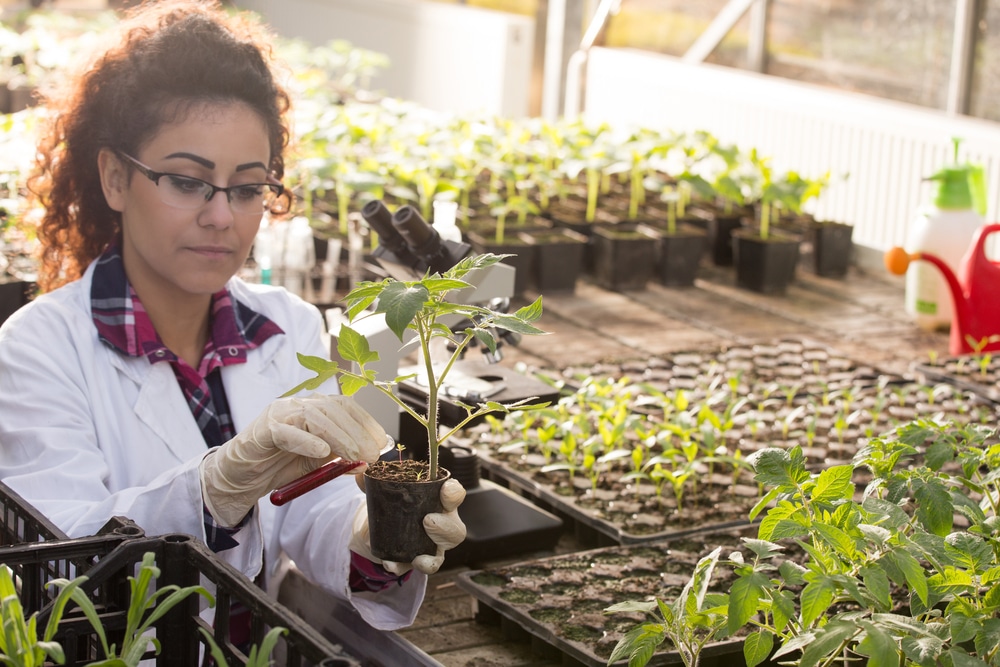As the fears facing climate change are changing the way in which we think about the world, when it comes to horticulture and the environment, there are more opportunities for a career in this field than ever. People now have the money, and the desire, to create that little bit of greenery which can help them relax. More people are spending money on landscaping and house plants, with a consequent increase in this aspect of horticulture. There is also a much greater interest in our environment and consumers are demanding a higher quality of fresh fruit and vegetables. There are two broad areas of Horticulture; amenity and commercial. Amenity horticulture concentrates on landscape design, including sport and leisure parks as well as ornamental use of shrubs and plants. Commercial horticulture concentrates on the production of plants and crops. Postgraduate Horticulture Courses are your best option when it comes to achieving a rewarding career in this field.
Commercial Horticulture:
Commercial horticulture presents a wide variety of opportunities from the production of greenhouse crops, fruit farming, and vegetable growing, to cereals production and forestry. The work is labour intensive, with set busy periods for harvesting and sowing, often requiring casual labourers, One of the recent successes, mushroom growing, is highly labour intensive, requiring many workers all year round. Mixed farms that have a large portion of their land dedicated to crop farming frequenfly employ managers to oversee the production, and marketing of crops. There are possibilities for promotion in this area but starting as a commercial horticultural labourer and working up to manager can take many years
Amenity Horticulture:
There are many different areas of employment open to someone with a qualification in amenity horticulture, from working in a garden centre or nursery to running large estate gardens, both public and private, or taking up a post with a public authority such as the Parks Department as groundspeople, with the opportunity to rise to supervisory or design grades. The work is, however, much more than just tending plants, as you will also need a good knowledge of horticultural science and equipment, as well as pest control and disease control. It can be seasonal work, but there are full-time, year-round positions available, especially in the house plant business – this area of employment can be more enjoyable, as it is less physical, and does not suffer from bad weather conditions, as outside work can be.
Organic Farmer:
There are two areas of organic farming – organic horticulture and organic livestock, both of which have seen a huge increase in recent years. Organic horticultural farming is a system of producing food without the use of artificial pesticides and fertilisers, and organic livestock farming involves raising livestock in a natural manner on grassland that has not been treated in any way with non-organic chemicals. All livestock is also raised without any growth promoters or tranquillisers.
With the recent BSE scare, and now the spectre of genetically-modified food looming large in the headlines, there is considerable demand for organic horticulture produce and organically raised livestock. Many farms are converting from conventional to organic farming, which takes a minimum of two years, and they must follow a strict plan agreed with a certification panel appointed by the Irish Organic Farmers & Growers Association (IOFGA) Inspection and Certificate scheme if they are to gain full IOFGA symbol standards. This is approved by the Department of Agriculture, Food and Forestry under EC regulations..
IOFGA provides information and assistance to farmers and growers interested in organic food production, and the simplest and cheapest way to start is with small crops such as strawberries, which prove to be the most profitable and easiest to market. There is huge popularity at the moment in organic ‘country produce’ such as jams and preserves, and in lavender or other herbs used for aromatherapy.
A route into organic farming would be through a degree in Agricultural Science, and then further education specialising in organic farming with Teagasc. An Bord Glas provide grants for organic horticultural enterprises, as well as advice on development of a business plan, marketing and on other administrative areas.
Landscaping & Garden Design:
A very fast growing area, as the proliferation of building in the last 12 months has created the need for common landscaped areas in office and housing developments, as well as more private gardens which need tending. This has led to a great demand both for landscapers and garden designers working under contract, and also for the nurseries supplying the industry by those people who want to do the garden themselves. With the increasing amount of apartment development, offering no individual gardens to their residents, landscaping of common areas within these developments is a fast growing industry. These gardens can be created instantly with careful planning and the right equipment. Public gardens and parks also offer employment in the areas of landscaping and garden design, as do many sport and leisure facilities.
There are huge opportunities for self employment in this area. Routes into landscaping and garden design can be found through the second year option of BAgrSc degree in UCD. This educates students in the scientific aspect of landscaping, with a sizeable amount of work carried out using computer-aided-design.
Learning the Skills:
There are various postgraduate horticulture courses offered in both amenity and commercial horticulture, as well as greenkeeping and turf management. It is possible to get a job without completing a course, but the chance of advancement is, of course,
reduced, and your knowledge is restricted. There is permanent employment available for about 90% of graduates and plenty of college places for people interested in taking courses in horticulture. Teagasc has 1,200 annual places in agricultural and postgraduate horticultural courses on offer providing practical and theoretical training. UCD’s Bachelor of Agricultural Science (BAgrSc) diverts into nine areas after the first year, two of which are Commercial Horticulture and Landscape Horticulture.
Getting the Job:
There is currently a shortage of workers in the growing area of landscaping, both with a company and as a self-employed landscaper – people who have recently set up on their own complain about there not being enough days in the week to carry out their work! Many florist and plant shops look for people with a qualification in amenity horticulture before considering them for employment.
Dublin County Council and Corporation employ many people in their parks department, with the opportunity of promotion going first to qualified horticulturalists. These positions will be advertised in the local press, as well as in the colleges. Seasonal and summer work is easy to pick up in nurseries, garden centres and commercial horticultural farms, and it is advisable for people considering furthering their education in this area. Also, these are the areas that offer the best prospects for full-time employment as a horticulturalist. Someone interested in attending the Irish Golfing Union / Teagasc Greenkeeping course should be working as a trainee greenkeeper before applying to the course. These positions are easily sought through direct contact with golf courses.
Skills & Attributes:
- Interest in plants.
- Drawing skills (for garden and landscape design).
- Physical strength for most jobs.
- Attention to detail.
- Patience.
- Must like working outdoors in all weathers.
Ups:
- Outdoor life.
- Varied work.
- Some areas can be financially rewarding.
- Good development / growth opportunities.
- Fulfilling work.
Downs:
- Can be physically tough and dirty.
- Have to work in all weathers.
- Success at mercy of weather.
- Seasonality of sales.
- Landscaping work often on a contract basis.
Postgraduate Horticulture Courses:
There are a number of taught and research-based postgraduate horticulture courses in Masters and PhD levels available across the country. Entry to postgraduate programmes normally requires either a first or second class honours primary degree in the appropriate discipline. Students undertaking postgraduate horticulture courses can expect research activities and work experience with industrial and commercial organisations which will is certainly of benefit when it comes to the career prospects of graduates.












Comments